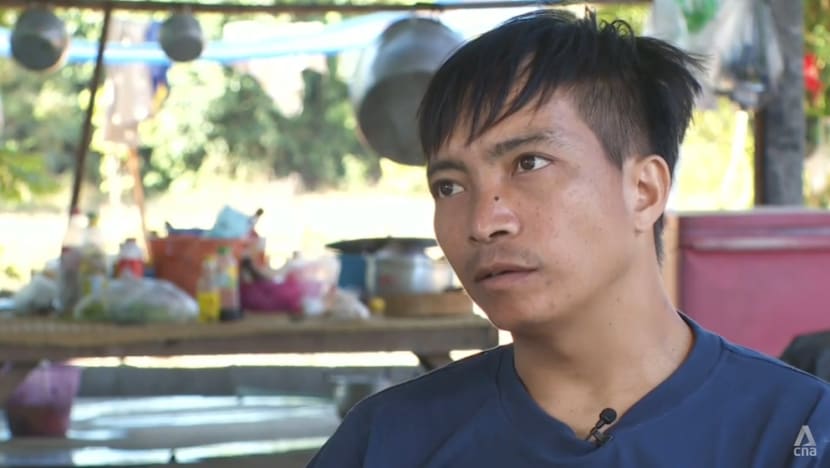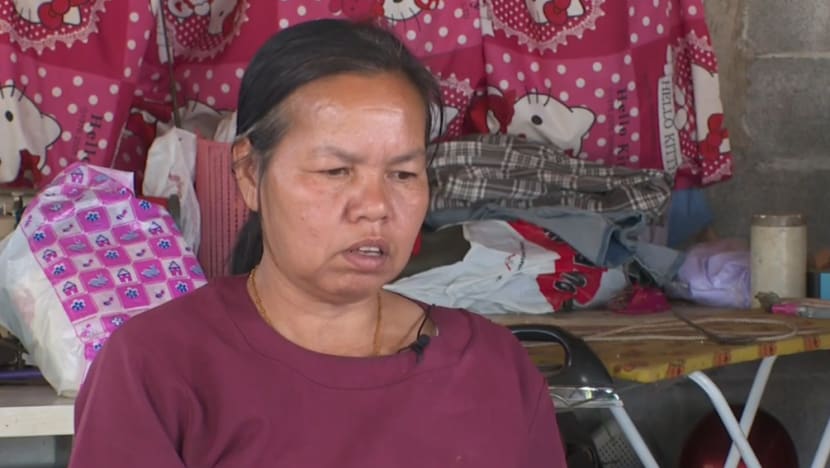Freed Thai national recounts his 50 days in Gaza as a hostage
A week ago, the first batch of hostages held in Gaza returned to Thailand. CNA visits one of the former hostages and his family to learn of his harrowing ordeal.

Thai national Manee Jirachart, who was taken hostage by Hamas militants during their Oct 7 attack on Israel and released after 50 days, speaks to CNA after returning home to Thailand.

This audio is generated by an AI tool.
UDON THANI, Thailand: When air raid sirens sounded in the early morning of Oct 7 in southern Israel, Thai farm worker Manee Jirachart scrambled out of bed and ran into a bunker.
He emerged shortly after, thinking it was safe.
But when a second set of sirens went off, he headed for the bunker again. This time, he was captured by Hamas militants.
“That was when we ran into them – Hamas. They put us in a car. We were six Thais – four were in the car, the other two, they killed,” Mr Manee told CNA on Thursday (Dec 7).
The 29-year-old and the other hostages were driven across the border into Gaza, where they were kept in prisons in underground tunnels for the next 50 days.
He said he was beaten by his captors at the beginning of his ordeal. His abductors gave him food, but did not speak to Mr Manee much.
“When I said I wanted to go home, they said that once the bombardment (by the Israeli military) stops, then I could,” he recalled.
Mr Manee usually goes by his nickname “Lucky”, and in a way he might count himself as just that.
He is one of 23 Thai hostages who were released during a week-long truce between Israel and Hamas.
It was news his father Chumporn Jirachart, who was himself once a migrant worker in Israel a decade ago, had been hoping for since his son was taken.
Mr Chumporn said: “That morning, a friend in Israel called me and said: ‘They are releasing the hostages, and your son is one of them.’ I didn’t believe him, so I said: ‘Send me proof’. So, he sent me a screenshot from the news – and there was my son! I felt really glad.”
At the time of his abduction, Mr Manee was in the final few months of his five-year contract in Israel, where he was working on a farm near Gaza.
He returned with the first batch of released hostages to Thailand earlier this month, and has since reunited with his family in his rural hometown of Ban Dung, in the northeastern Udon Thani province.
THAI WORKERS IN ISRAEL
Udon Thani is about 7,000km away from Israel but it is very connected to the Middle Eastern nation, with over 4,000 locals working there as migrant workers.
Nationwide, about 30,000 workers were in Israel before the war broke out, working mostly in agriculture. Thai nationals make up Israel's largest migrant worker groups.
They were enticed by the higher pay of up to US$1,800 a month – about 50 times what they would earn back home on minimum wage.
However, the stints are not without risks to their safety. Conflict in the region dates back decades.
On Oct 7, at least 240 people – Israelis and foreign nationals – were captured as hostages when Hamas militants rampaged through southern Israel and killed about 1,200 people.
Among them, Hamas gunmen killed 39 Thai nationals and abducted 32.
In retaliation, Israel mounted a devastating offensive that has killed more than 15,000 people in Gaza, according to the Hamas-run health ministry in the enclave.
The Nov 24 to 30 ceasefire offered some respite, with the two sides swapping hostages and prisoners.
Thailand had hoped that with the release of 23 of its nationals during the ceasefire, the rest would soon follow.
But when fighting resumed last Friday and with no end to the armed conflict in sight, concerns for the nine Thais left behind have only grown bigger.
THAIS STILL IN CONFLICT ZONE
The Thai hostages who were released observed a moment of silence at Bangkok's Suvarnabhumi Airport for their countrymen who were killed or are still held captive by Hamas.
In Mr Manee’s village, Madam Kanmee Lamnau watched his homecoming with both hope and despair.
Her eldest son Surasak Lamnau was also working in Israel when the war broke out, and she has been unable to reach him since.

“I asked his colleagues (in Israel) if they have seen my son. They said they haven’t,” she told CNA from her home while scrolling through pictures of him on her phone.
“Then I posted about him online. Someone recognised him and said he had been abducted along with his employer and some others, five of them in total.”
The provincial labour office in Udon Thani escalated the 51-year-old widow's search for her son all the way to the Ministry of Foreign Affairs in Bangkok. However, all that has borne no fruit.
Thai authorities said Mr Surasak is not among the Thai hostages known to still be held in Gaza, or among the 39 confirmed deaths.
He remains officially classified as “missing”.
Mdm Kanmee said she is not giving up. “I still have hope,” she said. “Because in the group of hostages (with Surasak), two have been released.”

COMPENSATION FOR RETURNING
Since the war, over 9,000 Thai nationals have returned home from Israel.
To encourage more to do so, the Thai government has promised compensation and other incentives, but they amount to just a fraction of what workers can earn in Israel.
Each returnee can get a US$1,400 one-time handout from authorities, and will also be eligible for a US$4,200 soft loan.
Labour officials said they are helping the returnees adjust, but it will take time.
Related:
“The province, be it via the ministries of agriculture or commerce, will help to promote occupation options (for the returnees) so that they have jobs and incomes that fit with their agricultural skills,” said Udon Thani provincial employment office chief Anuthep Sridawruang.
“As of now, since the situation is not completely settled, there are still people coming back and the compensation hasn’t been fully paid out yet.”
Yet, many more Thai workers are choosing to stay in Israel, drawn by the high salaries.
But for Mr Manee, the ordeal has put him off from returning to Israel for work despite having been offered an extension of his contract.
“They told me I can come back (whenever the situation has calmed down) and they would extend my contract for another year or two,” he said.
“But I don’t think I’m going to go back. I don’t think I can after all this. If I were to work abroad it would be another country.”

















